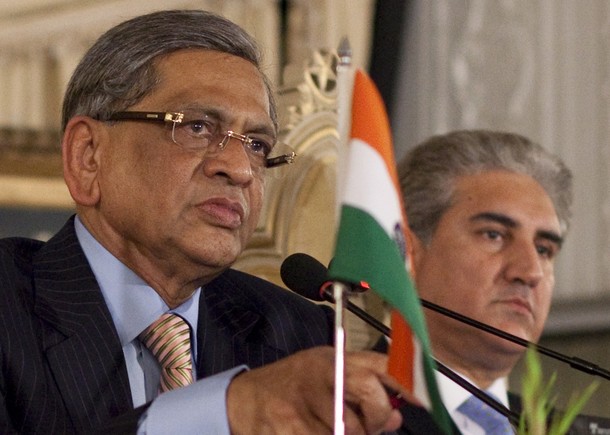
What happened at the post-meeting press conference of the Indian and Pakistani foreign ministers in Islamabad last week seemed to have come as a bit of a surprise to most observers here. On the other hand if recent events were objectively analysed what happened had to happen. Recent gains made by Pakistan despite its "running with the hare and hunting with the hounds" policies, by its open support of certain Afghan factions and Taliban groups and the simultaneous acquiescence to American use of its territory and airspace in support of its war on Islamic terror, seem to give it a sense of vindication.
It is now abundantly clear that the Americans have accepted that no war on terror is possible without Pakistan, which also means no exit from Afghanistan is possible without Pakistan. Pakistan has stood up to the US bluster and have forced it to accept the two tracked and two timing ways of the Pakistan Army and its intelligence agency, the ISI. Yesterday Hillary Clinton was forced to admit that high Pakistan officials were in the know about the whereabouts of Osama bin Laden, a day after she announced an additional $500 million as aid. It would seem that the USA finds itself left with little choice other than placating Pakistan. Even the beleaguered Afghan President, Hamid Karzai, seems to now believe that the keys to salvation are held by the Pakistanis.
India on the other hand, after its recent US granted access to the incarcerated Islamic terrorist Daoud Sayeed Gilani aka David Coleman Headley and his revelations in the presence of US officials, had apparently come to the somewhat premature conclusion that it had Pakistan cornered and had the USA in its corner. It did not read the ominous signals evident from the resumption of arms aid in the form of F-16 Block 52C fighters and air to ground laser guided missiles. Apparently it is not Pakistan alone that is hunting with the hare and running with the hounds in the region? Thus, while India felt that it could make the export of terrorism the focus of the agenda, Pakistan seemed to feel that the time was right to put the "K" in Pakistan back as the main topic of the Indo-Pak discourse.
With such different perceptions on what should be the main focus of the resumed dialogue, it was bound to fail. This brought to an abrupt end the pantomime staged by the two countries of what became to be called "the peace process." Both countries had their own uses for the “peace process.” For India it became a smokescreen to hide the inertness of the government’s policies from a restive and angry public opinion. For Pakistan it became a holding operation till a new set of facts more favorable to it emerged on the ground. When that situation seemed to have come about, it promptly dispensed with diplomatic niceties and rubbed India’s face in the peace pie cooked up for the ocassion.
Now India is forced to grapple with the essential reality that Kashmir is still the major bone of contention and Pakistan will not allow it off the agenda. To Pakistan the separatist agenda written up in the last days of the British period cannot be complete without it, and to India it means that it will be considerably diminished without it. What we seem to have forgotten is that there are two viscerally opposed ideologies and national identities squared off against each other. India sees itself as a multi-lingual, multi-ethnic and multi-denominational modern and secular nation state where religion is a private matter. To Pakistan religion is the very basis of existence. While Pakistan sees itself as the inheritor of the thousand years of Islamic domination of India, India sees itself as an inclusive and composite nation whose image of itself is enshrined in the opening sentence of its Constitution that defines it as a secular and socialist republic. Thus, while Pakistan’s claim over Kashmir is based on religion, India’s insistence on Kashmir is based on the vision of its founding fathers.
It’s now back to square one. Pakistan has waged proxy wars on India for over three decades India’s patience is now running thin. And the Indian people’s patience with its government is also running thin. Under such circumstances choices are easily made.
Mohan Guruswamy is a Nonresident Senior Fellow with the Atlantic Council’s South Asia Center. Photo: Reuters Pictures.
Additional Perspectives
Cyril Almeida – The Peace Chimera: India and Pakistan
Ayesha Jalal – AfPak Success Requires India Inclusion
Javed Jabbar – Pakistan-India Relationship
Image: krishna-quereshi.jpg
